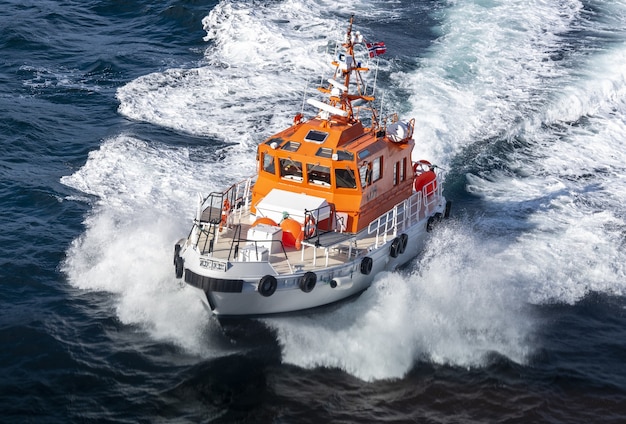How do I become a ship security guard?
Becoming a ship security guard can be an exciting career choice for those interested in working in the maritime industry. Ship security guards play a crucial role in ensuring the safety and security of vessels, crew members, and cargo. If you are considering a career as a ship security guard, this article will provide you with valuable information on the steps to follow and the qualifications required.
Educational Requirements
While there is no specific educational requirement to become a ship security guard, having a high school diploma or equivalent is typically preferred by employers. Some companies may also require completion of a certified maritime security training program. These programs provide comprehensive training on security protocols, emergency response, and maritime regulations.
Training and Certification
One of the key steps to becoming a ship security guard is to complete the necessary training and obtain the required certifications. The International Ship and Port Facility Security (ISPS) Code sets out the standards for maritime security, and many countries require ship security guards to be trained and certified under this code.
The specific training requirements can vary depending on your location, but typically include courses such as:
- Maritime security awareness
- Security training for seafarers with designated security duties
- Ship security officer training
These courses cover topics such as threat identification, access control, security equipment operation, and incident response procedures.
Licensing and Background Checks
In addition to completing the necessary training, ship security guards may also be required to obtain a license or certification from relevant authorities. This process often involves background checks and fingerprinting to ensure the individual is suitable for a security role.
It is important to note that requirements for licensing and background checks can vary depending on the country and the employer. It is advisable to research the specific regulations and procedures applicable to your desired location or employer.
Work Experience
Gaining relevant work experience is essential for becoming a ship security guard. Many individuals start their careers by working in entry-level positions within the maritime industry, such as deckhands or security assistants. This allows them to develop a strong understanding of the industry, gain practical skills, and build a network of contacts.
Working alongside experienced ship security guards provides valuable on-the-job training and mentorship opportunities. It is important to demonstrate good judgment, attention to detail, and the ability to remain calm under pressure as these are essential qualities for a successful ship security guard.
Career Advancement
Once you have become a ship security guard and gained some experience, there are opportunities for career advancement. Advancement may involve taking on leadership roles as a security supervisor or manager, or specializing in a specific area such as maritime cyber security or risk assessment.
Continuing education and professional development are crucial for staying updated with the latest security regulations and practices. Participating in industry conferences, workshops, and specialized training programs can help expand your knowledge and enhance your career prospects.
Remember, becoming a ship security guard requires dedication, training, and a commitment to maintaining the safety and security of vessels and the people on board. It is a rewarding career path for those who thrive in fast-paced environments and have a passion for maritime security.
How Hard is Marine Security Guard School?
Marine Security Guard (MSG) School is known for being one of the most challenging training programs in the United States Marine Corps. It is designed to prepare Marines for the demanding role of providing security for American embassies and consulates around the world. Here, we will explore what makes MSG School so difficult and what Marines can expect during their training.
Rigorous Physical Training
Physical fitness is a fundamental aspect of being a Marine, and MSG School takes it to the next level. The program includes intense physical training sessions that push participants to their limits. From grueling runs and obstacle courses to strength training exercises, the emphasis is on building endurance, strength, and mental toughness.
Extensive Weapons Training
Marines at MSG School receive comprehensive weapons training to ensure they are proficient in handling firearms and other security equipment. This includes marksmanship training, tactical shooting drills, and hands-on experience with various weapons systems. The training is rigorous and requires a high level of focus and attention to detail.
Intense Classroom Instruction
MSG School also includes extensive classroom instruction to educate Marines on various aspects of embassy security. They learn about threat assessment, emergency response protocols, diplomatic procedures, and cultural sensitivity. The curriculum is packed with information, and students must study diligently to absorb and retain the knowledge.
High Academic Standards
Marines must meet stringent academic standards throughout MSG School. They are evaluated through written exams, practical assessments, and oral presentations. The coursework covers a wide range of topics, including international relations, counter-terrorism strategies, and security procedures. Students are expected to demonstrate a deep understanding of the material.
A Demanding Schedule
MSG School is not just physically and mentally challenging; it also demands a significant time commitment. The program typically lasts for several months, during which Marines are fully immersed in their training. Days are long and intense, often starting early in the morning and extending late into the evening.
Strict Discipline and Attention to Detail
Marines at MSG School are held to the highest standards of discipline and attention to detail. They must follow strict protocols, adhere to uniform regulations, and demonstrate impeccable grooming and appearance. Any deviation from the established rules can result in disciplinary action or dismissal from the program.
A Competitive Environment
MSG School fosters a competitive environment among the participants. Marines are constantly evaluated and ranked based on their performance. This adds an extra layer of pressure as they strive to excel and outperform their peers.
Where do Marine security forces get stationed?
Marine security forces play a crucial role in protecting naval installations, facilities, and ships. These specialized units are strategically stationed around the world to ensure the safety and security of maritime assets. Marine security forces have a wide range of deployments, including:
1. Naval Bases and Ports
One of the primary locations where Marine security forces are stationed is at naval bases and ports. These installations serve as vital hubs for naval operations and require protection against potential threats.
2. Embassies and Consulates
Marine security forces are frequently deployed to United States embassies and consulates across the globe. Their presence is essential for providing security to diplomatic missions and personnel.
3. High-Threat Areas
Marine security forces may also be deployed to high-threat areas where U.S. military operations or interests are at risk. These locations can include regions with ongoing conflicts or areas prone to terrorism.
4. Forward Operating Bases
In support of expeditionary operations, Marine security forces are often stationed at forward operating bases (FOBs). These bases are established in remote or hostile environments to enable rapid response and maintain security.
5. Joint Task Forces
Marine security forces can be assigned to joint task forces, collaborating with other branches of the military to protect shared assets or conduct specialized missions.
6. Naval Vessels
Marine security forces are commonly stationed aboard naval vessels such as aircraft carriers, amphibious assault ships, and cruisers. They provide onboard security during deployments and ensure the safety of the crew.
7. Training Centers
Marine security forces may also be stationed at training centers where they undergo specialized instruction and prepare for future deployments. These centers play a vital role in maintaining the readiness of these forces.
8. U.S. Embassies
Marine security forces are responsible for providing security at U.S. embassies located in various countries worldwide. Their presence is essential in protecting American interests and personnel stationed at these diplomatic missions.
9. Military Installations
In addition to protecting naval assets, Marine security forces also provide security for U.S. military installations around the world. These installations include army bases, air force bases, and joint military facilities.
10. Crisis Response Units
Marine security forces also serve as crisis response units that can be rapidly deployed in times of emergencies, natural disasters, or humanitarian crises. Their ability to respond quickly makes them invaluable in such situations.
Conclusion
MSG School is undeniably challenging, requiring Marines to push themselves physically, mentally, and academically. The demanding nature of the program prepares them for the critical role they will assume in protecting American diplomatic missions. Those who successfully complete MSG School can be proud of their accomplishments and confident in their ability to handle the complexities of embassy security.



